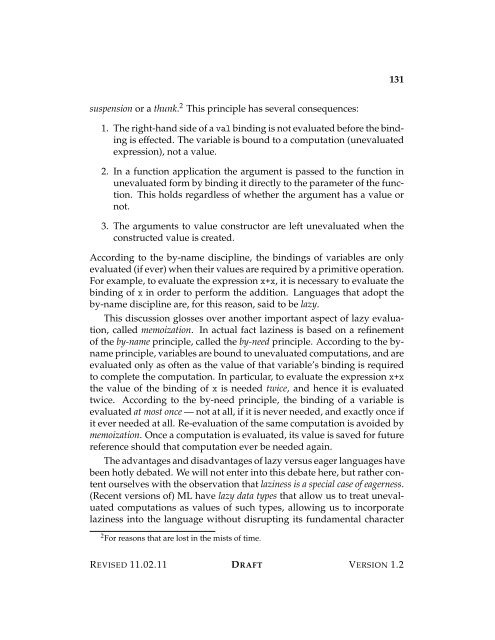sml
You also want an ePaper? Increase the reach of your titles
YUMPU automatically turns print PDFs into web optimized ePapers that Google loves.
131<br />
suspension or a thunk. 2 This principle has several consequences:<br />
1. The right-hand side of a val binding is not evaluated before the binding<br />
is effected. The variable is bound to a computation (unevaluated<br />
expression), not a value.<br />
2. In a function application the argument is passed to the function in<br />
unevaluated form by binding it directly to the parameter of the function.<br />
This holds regardless of whether the argument has a value or<br />
not.<br />
3. The arguments to value constructor are left unevaluated when the<br />
constructed value is created.<br />
According to the by-name discipline, the bindings of variables are only<br />
evaluated (if ever) when their values are required by a primitive operation.<br />
For example, to evaluate the expression x+x, it is necessary to evaluate the<br />
binding of x in order to perform the addition. Languages that adopt the<br />
by-name discipline are, for this reason, said to be lazy.<br />
This discussion glosses over another important aspect of lazy evaluation,<br />
called memoization. In actual fact laziness is based on a refinement<br />
of the by-name principle, called the by-need principle. According to the byname<br />
principle, variables are bound to unevaluated computations, and are<br />
evaluated only as often as the value of that variable’s binding is required<br />
to complete the computation. In particular, to evaluate the expression x+x<br />
the value of the binding of x is needed twice, and hence it is evaluated<br />
twice. According to the by-need principle, the binding of a variable is<br />
evaluated at most once — not at all, if it is never needed, and exactly once if<br />
it ever needed at all. Re-evaluation of the same computation is avoided by<br />
memoization. Once a computation is evaluated, its value is saved for future<br />
reference should that computation ever be needed again.<br />
The advantages and disadvantages of lazy versus eager languages have<br />
been hotly debated. We will not enter into this debate here, but rather content<br />
ourselves with the observation that laziness is a special case of eagerness.<br />
(Recent versions of) ML have lazy data types that allow us to treat unevaluated<br />
computations as values of such types, allowing us to incorporate<br />
laziness into the language without disrupting its fundamental character<br />
2 For reasons that are lost in the mists of time.<br />
REVISED 11.02.11 DRAFT VERSION 1.2







